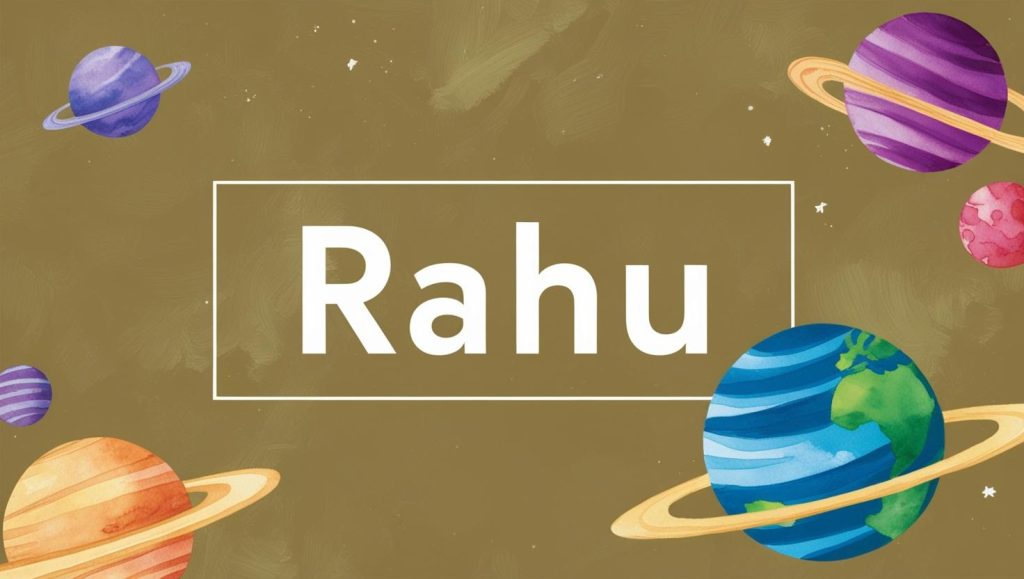The ninth house in Vedic astrology is known as the Dharma Bhava—the house of spirituality, higher education, long-distance travel, philosophy, ethics, fortune, and one’s connection with gurus or father-like figures. It represents our worldview, life’s belief system, and the quest for purpose. This house guides how we seek truth and our attitude toward law, religion, and universal principles.

When Rahu, the shadow planet of desire and illusion, is placed in the ninth house, it brings an intense, unconventional hunger for higher meaning, wisdom, and personal freedom from dogma. Rahu here does not blindly accept traditional values; it questions, rebels, and redefines the meaning of truth. This placement creates a karmic journey to explore new philosophies, alternative belief systems, and unusual spiritual paths.
Backlink: Rahu in the Eighth House
The Spiritual Restlessness of Rahu in the Ninth House
Rahu in the ninth house generates a restless yearning to understand the bigger picture of life. These individuals are deeply philosophical, but they often find themselves rejecting conventional religion, orthodox systems, or inherited belief structures. Instead of following what they are told, they are driven to create their own truth.
This placement can lead to exploration of foreign religions, new-age spirituality, atheism, or radical philosophies. They may study comparative religions, challenge their cultural background, or become teachers of unorthodox wisdom. Their path to faith is not linear—it involves questioning, doubt, rebellion, and ultimately a self-defined spiritual framework.
Rebellion Against Traditional Gurus and Teachers
The ninth house also signifies gurus, mentors, and the father. With Rahu here, the native may have conflicts or distance from father figures or spiritual guides. They may experience mistrust, disillusionment, or karmic tensions with those they are supposed to learn from.
This often results in rejecting external authority, especially if the guidance feels rigid, outdated, or hypocritical. The person is driven to become their own teacher, relying on experience, logic, and exploration rather than blind belief.
However, Rahu’s illusion can cause them to fall under the influence of false gurus or fringe ideologies, especially in youth. With maturity, they learn to discern genuine wisdom from spiritual ego or manipulation.
Obsession with Foreign Travel and Cultural Exploration
Rahu in the ninth house frequently creates a fascination with foreign lands, distant cultures, or alternative ways of life. The native may feel more spiritually or intellectually aligned with cultures different from their birth. They may travel abroad for study, research, or spiritual pilgrimage, often finding meaning outside their homeland.
Sometimes, there’s a strong desire to settle in a foreign country or gain international recognition through publishing, academia, or teaching.
These experiences broaden their view of the world and help them see that truth is not limited to geography, culture, or language—but is a personal, evolving journey.
Higher Education and Unconventional Learning
This placement often leads to a strong desire for advanced knowledge, but not always through traditional academia. The native may be drawn to self-study, independent research, spiritual texts, or alternative education systems.
Formal studies may be interrupted, delayed, or redirected, especially if the individual feels restricted by structured learning environments. However, they usually return to education through an unconventional or specialized route, sometimes becoming experts in rare or niche fields.
Rahu here supports careers as professors, philosophers, astrologers, spiritual advisors, authors, and cultural interpreters—especially when their knowledge is shared with boldness and originality.
Moral Dilemmas and Philosophical Conflicts
The ninth house also governs morality and ethics. With Rahu here, the person often goes through phases of moral confusion or philosophical crisis. They may struggle to find alignment between what feels right and what society says is right.
There can be periods of inner contradiction, where the native may live according to one value system but believe in another. These internal dilemmas are meant to provoke self-inquiry, not guilt. Over time, the person forges a code of ethics that is personally meaningful and spiritually aligned, even if it differs from societal norms.
Karmic Lessons Through Belief and Freedom
Rahu in the ninth house brings karmic lessons related to belief systems, spiritual independence, and the misuse or misunderstanding of truth. In past lives, the native may have blindly followed dogma or misused spiritual power. In this life, they are being challenged to question everything and arrive at truth through experience, not inheritance.
They are learning to honor personal faith without judging others, and to seek divine connection in a way that allows freedom, not control. This journey involves both confusion and illumination, but leads to an authentic, awakened worldview.
Challenges with Authority and Institutions
Rahu in this house may also create tension with legal systems, government, religious institutions, or educational authorities. The native may resist conforming to rules, reject traditional roles, or get into trouble for questioning those in power.
However, these struggles are not failures—they are part of Rahu’s mission to dismantle blind obedience and encourage critical thinking. The person must learn to balance rebellion with responsibility, and to build systems that reflect freedom and fairness.
Once they master this balance, they often become reformers, visionaries, or educators who help others break free from limiting belief systems.
Final Thoughts
Rahu in the ninth house is a placement of intellectual rebellion, spiritual experimentation, and karmic awakening. It pushes the soul to reject the known and seek the profound, not through books alone, but through experience, travel, and fearless inquiry.
Though the path may be unconventional and filled with doubt, it ultimately leads to a personal connection with truth, beyond religion, beyond culture, and beyond dogma.
The soul here is not meant to follow—it is meant to explore. And through that exploration, it becomes a light for others lost in belief systems that no longer serve.
